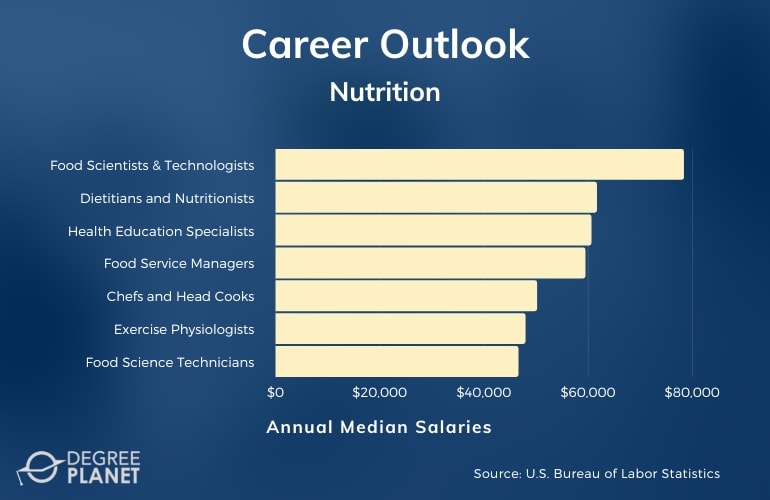If you have an interest in food and how what we eat relates to our health, then you might be interested in how to become a nutritionist.

Nutritionists are experts when it comes to food and how it impacts our health. They can help individuals or communities make better decisions about what they eat and how they eat it.
Editorial Listing ShortCode:
Read on to discover the common steps to becoming a nutritionist as well as the various career outcomes associated with this profession.
How to Become a Nutritionist

Becoming a nutritionist includes equal parts education and experience. The process usually starts before or during your undergraduate studies, and it can continue for the rest of your career, depending on your state’s requirements and your personal goals.
Here are some common steps to becoming a certified nutritionist:
- Earn a bachelors degree. You can complete a bachelor degree in nutrition or a related field, such as biology, chemistry, biochemistry, food science, or health education.
- Earn professional certification. Certification requirements for your chosen specialty in nutrition can vary from state to state.
- Decide if you want to earn your masters. Many professionals choose to earn a master’s degree or higher in order to further their nutritionist education and pursue more career opportunities.
- Follow the guidelines for licensing in your state. This step depends on the specialization or career path you select as a nutritionist.
- Maintain licensure and certification. Many certifications and licenses have a continuing education stipulation. Over the years, you’ll likely be asked to complete specified nutritionist education to renew your credentials.
There are several variables in the process, such as choosing your area of specialty. Your chosen specialty will dictate which certifications and licenses you’ll pursue. Licensure requirements can also vary from state to state. Certain specialties may also require a bachelors degree or higher.
Editorial Listing ShortCode:
As a certified or licensed nutritionist, your opportunities to continue learning may never end. Starting with a nutritionist bachelor degree or one in a similar field, your steps to becoming a nutritionist may depend on how you plan to use your knowledge.
3 Things You Can Do as a Nutritionist
Beyond the traditional role of a nutritionist, there are several professional fields in which having a nutritionist certification or license can be beneficial.
The professional opportunities you can qualify for will likely depend on your education, experience, and specialty area.
1. Personal Training

Many people think of a personal trainer as someone who guides them through rigorous exercises so they can get in shape. That is just one function of a personal trainer, though.
While today’s personal trainers provide helpful information about fitness exercises, they can also be instrumental in improving your overall health if they’re certified in nutrition. These fitness instructors or personal trainers may recommend dietary plans as part of their process.
2. Food Service

Food service professionals, such as chefs or caterers, can also benefit from nutritionist education. Having a background in nutrition could help you plan meals for others as well as accommodate a variety of dietary needs and restrictions.
Professionals who plan meals for large-scale facilities—such as hospitals or nursing homes, schools, and large office buildings—may also benefit from nutritionist schooling. This background could help you plan nutritious meals for a range of people and settings.
3. Food Science and Safety

Those who work in food science and safety may also appreciate nutritionist schooling, as it can give them further insight into consumer dietary patterns and potential risks.
Editorial Listing ShortCode:
Food science helps us understand how the food we eat can benefit or harm us. Food safety ensures we know how to handle and prepare items to reduce the potential of illness. In either field, knowing how our bodies use and respond to food can be helpful.
Nutrition Major Specialty Areas

There are several areas in which you can specialize when completing your nutritionist schooling. This allows you to concentrate on certain areas of nutrition that best match your career goals.
Some common areas of specialty include:
- Sports and Fitness. This type of nutritionist focuses on creating a diet plan that helps athletes with performance and recovery. A high-performance lifestyle can call for different nutritional options.
- Holistic Nutrition. Many people believe in the healing power of what we ingest. Holistic nutritionists help devise eating plans that naturally support regular body functions.
- Pediatrics. This type of nutritionist works with children to ensure their diet helps them thrive and grow. These children might be in situations in which their environment or a physical condition limits their overall health and wellness.
- Gerontology. Gerontological nutritionists help prepare diet plans for those who are in their senior years. In addition to being susceptible to certain conditions and impairments, the elderly experience changes in dietary requirements.
By choosing a specialty that reflects your professional interests, you can tailor your knowledge to the population you hope to serve.
Nutrition Careers and Salaries

Many of those who train to be a nutritionist do so in order to become a dedicated nutritionist, but there are many professions in which having nutritionist education can be beneficial.
According to the Bureau of Labor Statistics, here are the median salaries for positions related to the study of nutrition.
| Careers | Annual Median Salaries |
| Food Scientists and Technologists | $78,340 |
| Dietitians and Nutritionists | $61,650 |
| Health Education Specialists | $60,600 |
| Food Service Managers | $59,440 |
| Chefs and Head Cooks | $50,160 |
| Exercise Physiologists | $47,940 |
| Food Science Technicians | $46,590 |
| Community Health Workers | $46,590 |
| Fitness Trainers and Instructors | $40,700 |
| Home Health and Personal Care Aides | $29,430 |
Nutritionists and those who have completed nutritionist training may work as a personal trainer or consultant. They can also work in a hospital, treatment facility, or group home setting.
Editorial Listing ShortCode:
Additionally, they may choose to work in food service or food science, applying their knowledge to their menu and research.
Accreditation

When browsing for schools that offer nutritionist degree options, you may wish to pay particular attention to those that are regionally accredited.
Accredited schools have been evaluated for their academic standards. As a result, many certification or license boards may require that applicants receive their education at an accredited institution. Employers may also give preference to candidates who received their nutritionist schooling through an accredited program.
In addition, some financial aid opportunities, such as federal grants and loans, are only available to qualifying students who attend accredited schools.
Is Financial Aid Available?

The first step for most students who are seeking financial assistance is to complete the FAFSA, or Free Application for Federal Student Aid. Your FAFSA determines your eligibility for need-based assistance from the federal government.
You can also see if you qualify for scholarships or grants from the school you plan to attend. You may wish to discuss their financial aid opportunities when you apply. Private scholarships offered by professional organizations may also be available for aspiring nutritionists. If you’re currently employed, your employer may also offer educational assistance or tuition reimbursement.
Is Nutritionist a Good Career?

Yes, nutritionist is a good career for many professionals. Individuals who train to be a nutritionist have the potential to impact many lives, whether they practice as a nutritionist or choose to apply their knowledge to other related roles.
Helping individuals understand their bodies and nutritional needs is important in every stage of life. From pediatrics to gerontology, from athletes to individuals in recovery, nutritionists can be beneficial to many different people in a range of fields.
According to the Bureau of Labor Statistics, the median salary for nutritionists and dietitians is $61,650. These roles are also projected to grow in demand over the next ten years.
What Do Nutritionists Do?

Nutritionists help individuals link wellness with food. While nutritionists do not make diagnoses or prescribe medication, they can recommend certain diets and foods to individuals in order to help them manage or find relief from a medical condition.
Through their schooling, nutritionists learn about how different foods can impact the body and overall health. They also learn how vitamins, minerals, and other nutrients can aid in long-term wellness. Nutritionists often educate others in creating a diet that meets their individual wellness goals, providing insight and options to help them.
Are Nutritionists in High Demand?

According to the Bureau of Labor Statistics, the demand for nutritionists and dieticians overall is expected to increase by 7% over the next ten years. This is about as fast as the average growth for all professional fields.
Editorial Listing ShortCode:
Those who have trained to become a certified nutritionist may choose to work in a variety of settings, including hospitals, care facilities, schools, restaurants, and laboratories. Some individuals apply their nutritionist training to other health and wellness jobs. There are many professional fields in which your training as a nutritionist can be applied.
Is It Hard to Become a Nutritionist?

Becoming a professional nutritionist can take some time and energy to accomplish, but the process’s level of difficulty may depend on the individual.
A common first step is completing your bachelor’s degree in nutrition or a similar field. Areas of study in a nutritionist’s education can include microbiology, psychology, anatomy, dietetics, and biochemistry. You may also study social and cultural associations with food, as well as specific dietary plans and restrictions.
Depending on the certifications you wish to pursue, you may be asked to complete additional educational steps. Your employer may also encourage continuing education to keep you up to date in your field.
What Are the Qualifications to Be a Nutritionist?

The qualifications for becoming a professional nutritionist vary from state to state. Some require certifications for certain professions, while others have a licensing process for you to complete before you practice.
Common certifications include Certified Nutrition Specialist (CNS), Clinical Nutritionist, or Certified Holistic Nutritionist. There are many certification options, though, depending on the specialization and career path you choose. Licensing is also required by some states in order for individuals to represent themselves as professional nutritionists.
The licensing process often requires a specified number of supervised field work hours as well as passing a state examination. Holding a bachelors degree in nutrition or a related field is a common educational requirement.
Where Do Nutritionists Work?

Trained nutritionists may work in a variety of settings. Many work in a healthcare setting, such as a hospital, care facility, rehabilitation center. They may also act as personal consultants who help individuals learn how to maintain a healthy diet.
Others work in educational settings. Some professionals work as teachers for schools or community health centers, while others work as nutritionists for school systems and public meal outreach programs. Nutritionists can also put their skills to use as food safety advisors, encouraging proper handling, storage, and preparation of food.
Some nutritionists further their education to become food scientists, researching the impact of food and its nutrients.
What Skills Do You Need to Be a Nutritionist?

Much of what you study as part of your nutritionist schooling is based upon your specialty and what you wish to do with your degree after graduation. There are also some non-academic skills that can benefit future nutritionists.
For instance, nutritionists can benefit from:
- Clear communication skills
- Patience
- Empathy
- A keen sense of organization
- The ability to research and analyze various nutrition-related topics
Whether you work one-on-one with individuals, teach groups, or provide input for meal organization and assembly, these skills can help you in a variety of roles and fields.
How Much Money Can You Make with a Nutritionist Degree?

Your salary potential as a nutritionist depends on the type of job you pursue as well as your location, experience, and employer, among other factors.
According to the Bureau of Labor Statistics, the median annual salary for dietitians and nutritionists is $61,650. Most make between $42,530 and $93,640 each year. Salaries can vary by industry as well. For instance, outpatient care centers tend to offer higher pay for nutritionists and dietitians, with a median wage of $74,640.
Editorial Listing ShortCode:
Those who apply their nutritionist training to fields such as food safety and food science may encounter higher average salaries. Related positions in health and wellness foods may offer less.
How Long Does It Take to Be a Nutritionist?

The length of time it takes to become a nutritionist is often dependant on the types of certifications or licenses your state requires.
If you choose to pursue a nutritionist bachelor degree, many programs can be completed in 4 years of full-time study, depending on the school and program structure. Many states allow nutritionists to practice with a bachelor degree. A master’s degree in nutrition can often be completed in 1 to 2 years.
Many certification programs and licensing processes encourage students to complete a certain number of supervised internship hours as well, ranging from 500 to 1,200 total hours.
What’s the Difference Between a Registered Dietitian vs. Nutritionist?

Though many people use the terms “dietitian” and “nutritionist” interchangeably, they are somewhat different roles.
A registered dietitian:
- Has completed an educational program accredited by the Accreditation Council for Education in Nutrition and Dietetics (ACEND)
- Certification options include Registered Dietitian Nutritionist (RDN) and Registered Dietitian (RD), administered by the Commission on Dietetic Registration
A registered nutritionist:
- May complete a bachelors program in nutrition, public health, or a related field
- Can become a certified nutrition specialist (CNS) through the Board of Certification for Nutrition Specialists (BCNS) with a master’s degree and additional field experience
Not all states have certification for nutritionists. Dietitians are more regulated by law, so they can often have more responsibilities as well.
Is Being a Nutritionist Worth It?

Yes, being a nutritionist is worth it for many professionals. Training to become a nutritionist can be a rewarding experience for many individuals, as you gain insight into the foods we eat and how they impact our health.
Those with a nutritionist’s background may find themselves working in a variety of fields in which food and wellness can be connected. This may include work in exercise, athletics, physical rehabilitation, research, and education.
Editorial Listing ShortCode:
Many people can be impacted by the work of a professional nutritionist, which attracts many individuals to the career as well. The Bureau of Labor Statistics projects 7% job growth for nutritionists and dietitians over the next ten years.
Getting Your Nutrition Degree Online

If your career goals include understanding the impact food can have on human behavior, performance, and wellness, then you may be interested in learning how to become a certified nutritionist.
Whether you prefer to research dietary options or educate others in the power of proper nutrients, getting your nutrition degree online can help you prepare you for a range of potential careers. You can choose from one of the many specialties offered in the field of nutrition and dietetics in order to tailor your education to reflect your professional goals.
In addition to bachelors programs online, a growing number of universities also offer online masters in nutrition programs.
The sooner you start exploring accredited schools, the sooner you may find the nutrition degree program and specialization that’s right for you.

